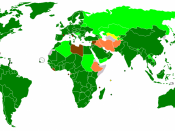The World Trade Organisation (WTO) came into being on the 1st January 1995. It is based in Geneva, Switzerland and was created by the Uruguay Round negotiations. It is the successor to the General Agreement on Tariffs and Trade (GATT) established in the wake of the Second World War. While the WTO is still young, the trading system that was originally set up under GATT is already 55 years old. With 144 member countries, the WTO has six main functions: administering trade agreements; acting as a forum for trade negotiations; settling trade disputes; reviewing national trade policies; assisting developing countries in trade policy issues and cooperating with other international organisations. Whereas GATT had mainly dealt with trade in goods, the WTO and its agreements now cover trade in services, and in traded inventions, creations and designs (this includes copyrights, trademarks).
GATT is now the WTO's principle rulebook for trade in goods.
The member nations operate a non-discriminatory trading system that spells out their rights and obligations. Each country receives guarantees that its exports will be treated fairly and consistently in other countries' markets. Each promises to do the same for imports in its own market. The system also gives developing countries some flexibility in implementing their commitments.
The WTO's procedure for resolving trade quarrels under the Dispute Settlement Understanding is vital for enforcing the rules and therefore for ensuring that trade flows smoothly. The system encourages countries to settle their differences through consultation. Confidence in the system is borne out by the number of cases brought to the WTO - 167 cases by March 1999 compared to some 300 disputes dealt with during the entire life of GATT (1947-94).
In early 2000, new negotiations on trade in the areas of agriculture and services, mandated by the Members when they...



Lot Of Info...
A lot of historical and present information regarding the WTO and its functions. Certainly helpful for anyone who needs information regarding WTO. People should surely find this a useful essay!
0 out of 0 people found this comment useful.